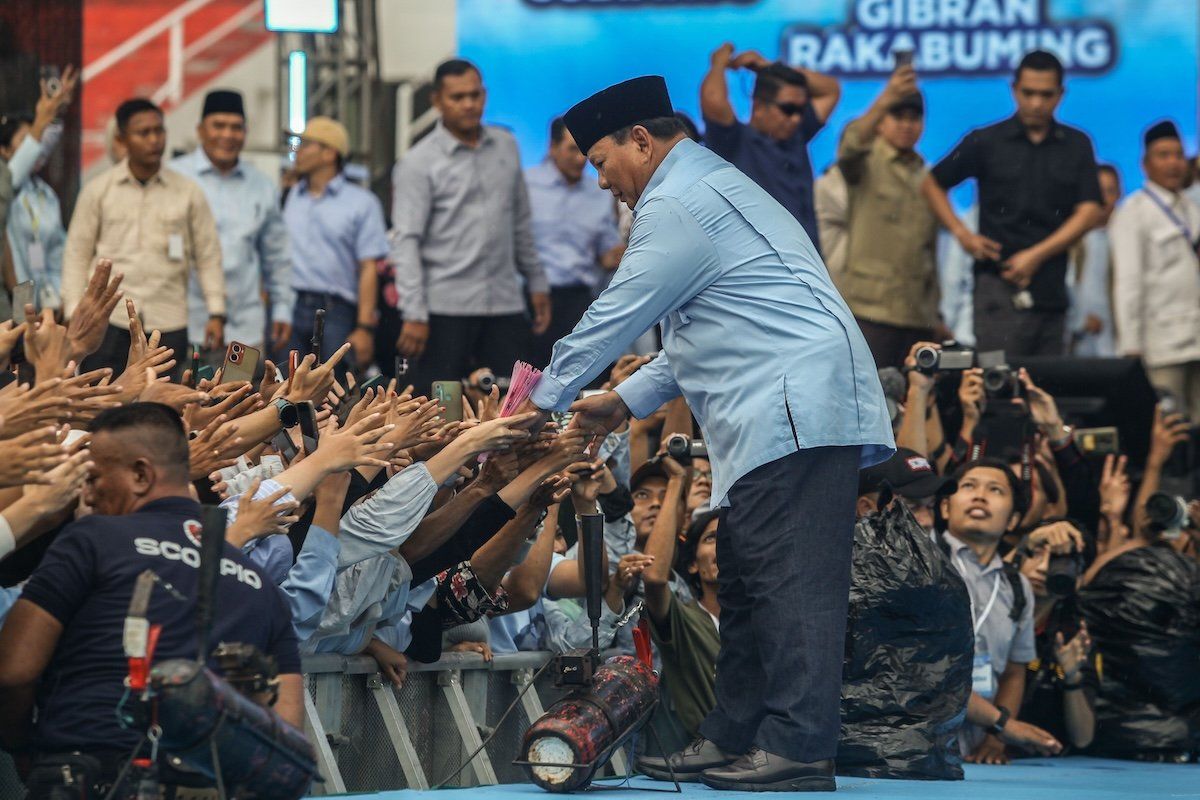Will Indonesia choose a military officer-turned-cuddly grandpa for president?
Indonesia's Defence Minister and presidential candidate Prabowo Subianto is gesturing to his supporters during an election campaign rally at the Gelora Delta Stadium in Sidoarjo, East Java, Indonesia, on Feb. 9, 2024.
Voters in the world’s third-largest democracy will go to the polls on Wednesday to choose their next president. The popular incumbent Joko Widodo, aka Jokowi, is barred from running for reelection by term limits and has thrown his support behind three-time presidential candidate Prabowo Subianto, a former military officer and the current defense minister. Thanks to this support, in addition to generous campaign promises and a slick image makeover, Prabowo, 72, appears well-positioned to join the club of septuagenarian world leaders. We asked Eurasia Group expert Peter Mumford how this came about.
What are the main issues in the election?
Cost-of-living concerns and inequality are key themes, which Prabowo in particular is seeking to tap into with generous — but costly — spending promises such as free lunches for students. In previous contests, divisive identity politics have shaped voter preferences, but there has been less of that in this election.
Both Prabowo and former Central Java governor Ganjar Pranowo offer continuity from Jokowi’s administration albeit with some differences — Prabowo would be more nationalist and populist, Ganjar likely more business-friendly. Former Jakarta Gov. Anies Baswedan is running as the “change” or “anti-Jokowi” candidate.
That said, personalities, rather than issues or policies, tend to drive elections in Indonesia.
Is personality the reason for Prabowo’s popularity? Isn’t he a controversial former military officer?
Yes, he is. Prabowo has been accused of committing human rights abuses during his time as a special forces commander under the Suharto “New Order” dictatorship that lasted from 1967 to 1998; he was dismissed from the military but was never charged with any crimes. Prabowo was close to the former dictator and even (for a time) married to his daughter.
In the past, Prabowo has referred in broad terms to “reducing the cost of democracy” — seen by some as a euphemism for reversing the move to direct presidential elections in Indonesia or other steps in a more authoritarian direction. Prabowo’s most ardent critics fear he will return to the Suharto era with a “New Order 2.0,” but this seems unlikely and would trigger strong public pushback. The defense minister has long had a “strongman” persona that appeals to a segment of the population.
But he has taken steps to broaden his appeal, right?
Yes, he has deployed social media effectively to rebrand himself and broaden his appeal. The cat-loving, cuddly grandpa cartoons and avatar appearing on billboards and social media output are intended to moderate his previously stern and out-of-touch image. Meanwhile, social media clips of him dancing seek to dispel any concerns about his age and rumors surrounding his health.
And how significant is Jokowi’s support?
The popular president’s clear but unofficial support is probably the key factor in Prabowo’s surge in the polls. Jokowi defeated Prabowo in the presidential races of 2014 and 2019 and then made the former military officer defense minister in his second administration. Jokowi’s son, Gibran Rakabuming Raka, is Prabowo’s running mate in the current election.
Prabowo is now polling very close to the 50% support threshold needed to win the presidency in the first round of the election, but turnout will be a key watchpoint. He is popular with younger voters, who tend to turn out in smaller proportions. Anies and Ganjar trail far behind, locked in an intense battle for runner-up and a place in the potential second round. If there is a runoff, Prabowo will still be the clear favorite, regardless of whether his opponent is Ganjar or Anies.
Why is Jokowi so popular and what is his legacy?
Jokowi is unusually popular for a president who has been in power for nearly ten years. Much of this is down to his “man of the people” personality, despite concerns among his more pluralistic backers about his weakening support for democracy and good governance in recent years. He somehow retains an “outsider” appeal despite being in power for so long and in recent years joining the establishment tradition of dynasty building (as shown by the presence of his son on Prabowo’s electoral ticket).
Jokowi has failed to achieve his promised 7% economic growth rate, but Indonesia has outpaced most other emerging market countries. Jokowi has also led significant progress on infrastructure development — most notably the launch of the Jakarta-Bandung High Speed Train (though not without controversy), Jakarta subway, and new tolls roads, especially on Java island — and improving the business environment (though many challenges remain). Poverty and unemployment are decreasing as well, though youth jobless rates are concerning, and inequality remains high.
What challenges will the next president face?
The next president will inherit a relatively strong economy; the priority will be sustaining the positive momentum and further boosting growth while also addressing youth unemployment and inequality. Delivering on populist campaign promises could be a challenge, especially for Prabowo, who has offered more giveaways. Any weakening of democratic institutions — should it occur — would likely trigger social protests. Backward steps on reform or governance could weaken the country’s appeal for foreign investors and its growth trajectory. Meanwhile, balancing relations with the US and China will take careful handling, though the elections are unlikely to result in a shift away from Indonesia’s longstanding “non-aligned” foreign policy.
Edited by Jonathan House, senior editor at Eurasia Group.
